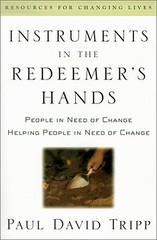Book Review Preview: Instruments in the Redeemer's Hands
 I've recently begun reading
I've recently begun reading Instruments in the Redeemer's Hands: People in Need of Change Helping People in Need of Change by Paul David Tripp. I hope to put a book review together upon completion. So far I've found it to be a very well-written and compelling book. The thesis of the book, in essence, is that too often Christians assume that "counseling" in the church is the domain of professionals. This assumption is too often fed by an unbiblical view of the pastoral ministry as *the* "ministry" -- when in fact, the saints themselves are the ministers and pastors are called simply to equip them to do it.
Having read the first 1/4 of the book, I've been impressed especially by Tripp's emphasis that preceding counseling -- informal and formal -- there must be proper understanding of what causes behavior, namely, the *heart*. He uses a number of helpful autobiographical examples to drive home this point.
One thing he points out a number of times which rang especially true is that too few Christian marriage, family and relationship books spend any time talking about the core causes underlying conflict and problems, i.e., the desires of our hearts. Much energy in these books and counseling is spent on improving communication, etc. But as he points out wisely, the problem is often not merely failing to communicate effectively with another person, but our own fallen hearts. As I've thought on a number of occasions, it's not other people who make me angry -- it's my own sinful heart. After all, Jesus in his perfect manhood would still never have sinned even under the duress of my life. It seems vain to even hint at it, given his holy response to the suffering of the cross. The point is, my sinful heart at the core of my problems -- not the external stimuli that reveal my heart.
In any case, Lord willing, I'll finish this book within the millenium and be able to offer a review.



